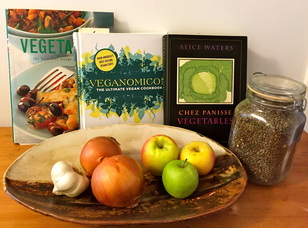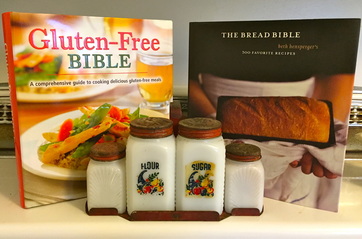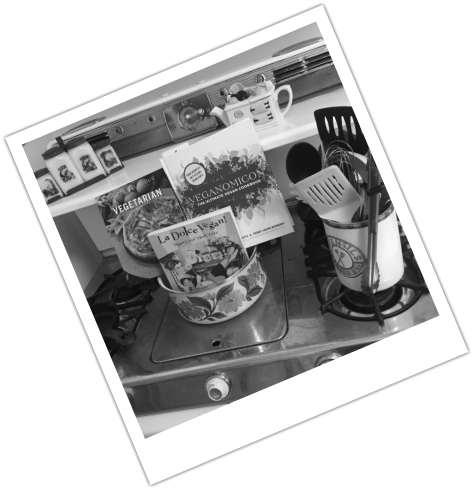 Photo Lisa Houston
Photo Lisa Houston Chances are better than ever that there will be a vegan at the table, or that you yourself have some dietary restriction or preference that may raise an eyebrow or two. I’ve put together some etiquette tips for both sides of the unspoken war of dietary differences.
I’m not seriously trying to tell you how to behave. But maybe hearing these “rules” will turn some assumptions around for you, or find a softer spot in your heart for those “picky eaters.” It’s a two-parter, first part for vegans, second part for carnivores. No fair skipping the part that’s for you. I didn’t write this to give fuel to the fire of people’s prejudices.
Part I
How Not to be a Rude Vegan
1. Have a one or two sentence answer ready for the question, “Why are you vegan?”
How about “Because it’s better for my health, and I believe it’s better for the planet.”
Or, “Because it just feels right for me. I enjoy it.”
Those are both nicer than, “Because if we all don’t stop eating beef, the world will be over by next Tuesday.”
Be truthful. But be kind as well. Being vegan does not make it OK to tell long, terrifying stories to people who have shown only a modest interest in you. All the usual rules of politeness, about not talking about subject matters that don’t interest your audience, apply to vegans.
If somebody is defensive, or even rude in their questioning or comments, you could try keeping it light. Tell them you’re like a carbon offset for their hamburgers. If that doesn’t work, use whatever other techniques you have for dealing with rude people. You must have discovered some tricks by now.
2. Hungry? Too bad.
Nobody made you be vegan. It’s nobody else’s fault that you’re vegan. It’s nobody else’s responsibility to make sure there’s something vegan for you to eat. Get your head around the fact that there isn’t always going to be something for you to eat, and also get your head around the fact that you aren’t the only one who’s going to feel bad about that. Your host, hostess, or even your fellow diners if you are eating out, will likely feel badly if there isn’t something for you to eat, and you have a choice: you can make them feel worse and spoil the evening, or you can explain why eating a meal of nothing but olives is your favorite thing to do. In fact, it’s exactly what you are in the mood for. And then move on and enjoy the company.
This may require that you develop some ability to tolerate being hungry. It might help at such times to remember that most of humanity has been hungry for most of our existence. Unlike proponents of the new word “hangry,” it seems to me that even if you’re hungry, you still gotta be polite. And maybe more. Maybe if you truly believe in veganism, than consider yourself a Vegan Goodwill Ambassador, and don’t be a drag. If you can’t be hungry without being “hangry,” being vegan might not be the right choice for you, at least not if you ever want to leave the house.
It might also help to take some of the perfectionism out of your veganism by realizing that you can make up certain nutritional deficits later. Maybe when you go to a restaurant with friends, all you can eat is bread without anything on it. So? Not to sound like an old-fashioned parent, but there are kids starving in…well, there are kids starving everywhere, actually. So enjoy the bread, or water, or olives, and when you get home, eat a pound of cauliflower.
3. Help others help you.
Make it easy for wait staff or hostess to help you by making specific requests. Often, if you ask the chef to cook some vegetables in olive oil, guess what? They’ll do it, if you ask nicely. Don’t assume that telling someone you’re vegan is enough. You may need to tell them that you you’re vegan, which means that you don’t eat butter, or cheese, or eggs, or milk. That about covers it. When traveling in foreign countries, I always try to learn the words for fish, eggs, meat, poultry, and dairy products, so I can say, “I don’t eat that, I don’t eat that, I don’t eat that.” Don’t expect someone to know what vegan means. Or what gluten-free means, or any of that. If your dietary choices vary from the norm, education is part of the gig.
Offer to bring a vegan dish, or pick a vegan-friendly restaurant. Familiarize yourself with cuisines of the world to hunt for vegan options within them.
The point is, don’t expect someone with twenty guests or a restaurant full of tables to come up with creative solutions for you on the spot. You can think ahead to strategize. Personally, I don’t always know what’s the best thing for me to eat. Why should I expect somebody else to have all the answers for me when we just met?
4. One of the greatest surprises to me about becoming vegan, after decades as a vegetarian, is how much of a spiritual practice I find it to be, in large part because of the situations above, but also because I relate differently to satisfying my hunger. A lot of my old eating patterns look to me now like they are less about hunger or nutrition, and more in the family of craving and satisfying, even to the point of being pretty far along on the spectrum of addiction behaviors. I think this may be because it’s more of a slow burn to eat a vegan meal or snack. Less of a slam of energy.
In that way, for now, it is a good choice for me, and part of what I enjoy about being vegan. So, if being vegan is a spiritual practice for you, then take those opportunities when there’s nothing to eat, or when someone seems a bit defensive or judgmental about your being vegan, as part of the practice.
So don’t tell other people they should be vegan. How the heck do you know what other people should eat? Are you their nutritionist? Are you their mother? Don’t be a vegan bully. Talk about your own experiences if people are interested, otherwise, talk about an area of common interest.
 Biblical Wars (Photo Lisa Houston)
Biblical Wars (Photo Lisa Houston) How Not To Be Rude to Vegans
If you’re a true bigot in all regards, the following won’t be much help to you. But if you are generally a tolerant and forward-thinking person, but you just aren’t buying the whole vegan thing, do the following:
Take the word “vegan” and replace it in your mind with some noun describing someone you would never, in a million years discriminate against. I realize that being vegan is different than being gay, or black, or Muslim. But, just as an exercise, if you’re someone who has a negative reaction to vegans, take one of your favorite anti-vegan arguments, and replace the word “vegan” with “gay.” Talk about how being straight is so much better, how you just don’t get being gay, how you don’t really feel comfortable having dinner around gays.
Done?
The point of that little exercise is simply to say that there is a prejudice. A bigotry even, that many people have against vegans. Because vegans are different. (And because you think we want to take away your hamburgers.)
So, for non-vegans:
1. Be courteous to vegans. A vegan person is entitled to the same courtesies you afford other people. I know some really nice people who would never attack somebody for being catholic, or wiccan, or for smoking, or being addicted to America’s Next Top Model. But that same person will be quite aggressive about demanding to know why I’m vegan. It should go without saying, but it doesn’t: don’t attack vegans for being vegan. Really. It’s not nice. Bigotry. Discrimination. Lack of understanding. It’s not funny. It’s not OK.
It’s very hip to add bacon to everything. Maybe you love meat, but don’t be like the alcoholic who tells people who don’t drink that they’re no fun. As with religion, sexuality, politics, being tolerant of one another's differences is the only way to have a decent relationship. Don’t make an exception in your manners for dealing with vegans.
2. If you ask someone, “why are you vegan?” be aware that it is an intrusive question. Any question about someone’s personal habits is.
“Why do you wear your hair like that?”
“Why do you drive instead of walk?”
“Why don’t you drink?”
If you’re going to ask this personal question, don’t ask it like “why the hell are you vegan,” and then interrupt the response to talk about how great spare ribs taste in barbeque sauce. If you ask, ask nicely. This means ask out of sincere interest, and with a willingness to listen to the answer.
3. Don’t pity vegans.
I have some friends who are very concerned that I do not recognize Jesus Christ as my one true savior. That’s a problem for me, and I have to admit they’re not really close friends because it never feels good to me to have my important life choices second-guessed, or to feel like somebody thinks they know better for me than I do for myself.
Don’t tell a vegan that you could never be vegan because you “don’t want to give up the sensuality of enjoying food.” Or that you “can’t imagine life without meat.” If you met someone from Tucson, would you say out loud, “Jesus, I could never in a million years imagine living in Tucson?” But I’ve had many people say say those things to me about being vegan, or respond to learning I’m vegan by saying, “Jesus, I could never in a million years be vegan." I'll admit, such comments don't bring out the best in me. It makes me want to reply, "well, I'd never wear that shirt, so I guess we're even."
If you’re close to that person, then have the honest conversation, because maybe you’ll want to take the trouble to truly understand, and maybe they’d like to talk with you about it, but if you’re not that interested, and just don’t like the idea of being vegan, then here’s the solution: Don’t be vegan.
4. Unless you’re the kind of person who goes around critiquing parents for their childrearing skills in general, don’t critique vegan parents, or parents of vegans.
And if a young person is vegan by their own choice, be especially kind, and take an interest. It is an opportunity to encourage that young person in making their own choices.
Final thoughts for Vegans:
If there is a single cause to the current, ongoing destruction of our planet, it is human entitlement. We, and our ancestors before us, tore up the planet because we felt we had a right to do so. And we continue to believe that we have a right to the luxuries we enjoy, at the expense of the planet. So, if veganism is to be part of the solution, we can’t, as vegans, behave as part of the problem. We are not entitled to something to eat at all times. Nobody is. And we’re not entitled to have everybody around us understand and sympathize with what we’re doing. It’s nice when they do, but it’s not a right.
Entitled behavior on the part of vegans will not defeat its larger purpose, because it usually is less costly in environmental terms to eat vegan than not to eat vegan. Vegans are not making that part up. But if we, as vegans, put our best foot forward, then by principles of attraction as well as necessity, more people in the world will become vegan, and everybody, meat eaters and vegans alike, will win. I first became a vegetarian because my big sister stopped eating meat, and I just wanted to be like her, because she was (and is) so super-cool. If vegans are obnoxious, fewer people will want to be vegan.
Final thoughts for Non-Vegans:
Get used to vegans. I first became vegetarian in 1977. Over the years, I got my share of dirty looks, confused expressions, and long lectures about the glories of meat, but look where we are now. Many people eat vegetarian some percentage of the time. Almost all restaurants have vegetarian options. I’d say veganism now is about where vegetarianism was in the late eighties, give or take. The time when veganism is considered utterly mainstream is coming, rapidly. Not because evil vegans are going to take over the world and force everyone to wear yoga pants and express gratitude for each and every moment, by law. But because people on the whole understand that we need as a species to change our eating habits, both for reasons of personal health and for environmental survival.
So you may as well be nice to vegans because you’re going to have to deal with a lot more of them in the future. And none of us want to end up like that county clerk who cried on TV, distraught and confused because she just doesn’t want to give marriage licenses to gay people. So very sad to be behind the times.
Beyond that practicality, you’re a nice person, you don’t want to hurt anyone. Consider that the vegan at the table (or the gluten-free person, or the paleo dieter) may have had health problems you know nothing about. They may have struggled for months or years with digestive pain, poor energy, debilitating allergies or depression. There may be a spiritual component to their choices that they are just catching the thread of. They know the desire to change their diet is something to honor, but maybe they can't explain it fully to themselves yet, much less explain it to your satisfaction. For all of us: Erring on the side of compassion is never a bad idea. It's actually a pain in the ass to be vegan. Generally speaking, people don't do it without good reason.
Conclusions: We’re all in this together.
The eating habits of the world are changing for the same reasons they have changed over millennia: so that we can adapt to the circumstances we find ourselves in, and evolve in the healthiest ways we can.
The story of Thanksgiving is one of people from completely different cultures coming together to appreciate one another. We may not understand why someone is vegan, or why someone seems to react strongly, or negatively when they learn someone is vegan or has a dietary restriction. But unless we’re pronouncing judgment on one another, we don’t have to have all the facts. Did those gathered at the first thanksgiving fully understand one another's traditions? Of course not.
I realize that we talk about Thanksgiving being mostly about gratitude, and I suppose it is. But the beauty of the story is to be found in the celebration of differences, and above all the celebration of the fact that the Native Americans welcomed and helped these newly arrived refugees, instead of killing them. It was a wondrous event, when people who were very, some would even say intrinsically different from one another, found ways to communicate with
kindness,
acceptance,
generosity,
and gratitude
for one another,
instead of with hostility.
We would all do well to remember the history of the holiday, and the fact that differences when tolerated, and especially when celebrated, have the potential to bring us closer together, as a human family.
Wishing you and your family and friends, the vegans, vegetarians, carnivores, and omnivores among them...
A Happy and Tolerant Thanksgiving!

Love,
Lisa
 RSS Feed
RSS Feed